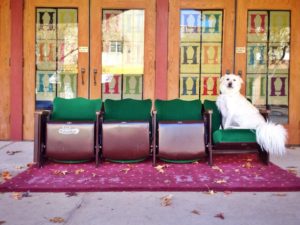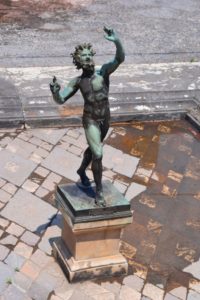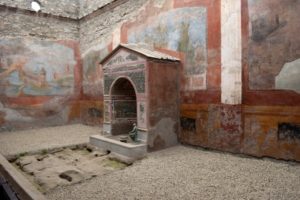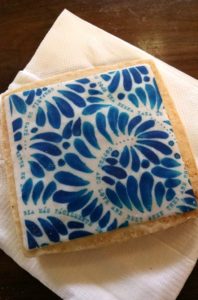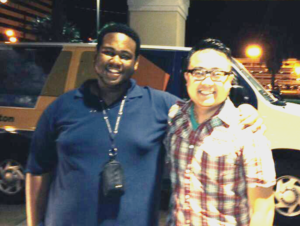By Jenuine Poetess
Here at the Act Locally Waco Arts & Culture blog we muse often about events, programs, the value of arts and cultural activities and the inclusion of creative health as a matter of justice along side employment, education, hunger initiatives, and other aspects of cultivating a sustainable community. Hopefully, something here has inspired some of you to pick up your own instrument, pen, brush, or tool-of-choice to begin making your own art works. For some of us though, it can be difficult to know where to begin, even when we are inspired. And even people who create on a regular basis sometimes find themselves in a dry spell.
In this month’s post I share some of the resources I have turned to through the years to get started or to get through a creative block. I hope you find something here to prime the pump.
Books:
My personal selection of books reflects my primary creative discipline of writing. Recently I’ve started branching out to more visual art mediums as well.
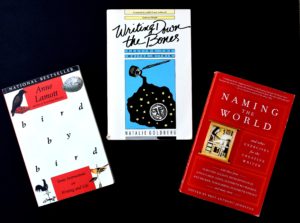 These three books are an excellent starting place for any writer:
These three books are an excellent starting place for any writer:
Bird by Bird by Anne Lamott is a witty, candid, exploration of where to begin and how to continue a healthy writing practice. Lamott assures us that whether we are writing a novel, memoir or multi-volume series, it will be accomplished, one sentence at a time.
Natalie Goldberg’s Writing Down the Bones works by shaping the person who is the writer. By challenging mental blocks and obstacles, she helps us stretch our imaginations to make space for all of our uncensored thoughts.
Just like athletes must move through the paces of pushups, sprints, and weight-lifting to get ready to perform on the field, strong writers engage in exercises to get ready to perform on the page. Naming the World and A Writer’s Book of Days by Judy Reeves (not pictured) are two excellent sources of varied writing exercises. While what you compose in an exercise may not be a masterpiece, hopefully it will move away the clutter so you can access the real writing gems later.
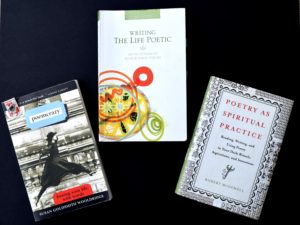 For those who specifically wish to hone their poetic craft and practice, I highly recommend these three books: Poemcrazy by Susan goldsmith Woolridge, Writing the Life Poetic by Sage Cohen, and Poetry as Spiritual Practice by Robert McDowell as well as an on-line resource Writing from the Soul both website and social media site. If you follow the social media site, new writing prompts are posted in the form of photos every week. From taking a walk, to collecting trinkets, to identifying and practicing technical poetry forms, these resources offer commentary, exercises, and invitations to explore one’s inner and outer worlds in order to enrich one’s poetry pages.
For those who specifically wish to hone their poetic craft and practice, I highly recommend these three books: Poemcrazy by Susan goldsmith Woolridge, Writing the Life Poetic by Sage Cohen, and Poetry as Spiritual Practice by Robert McDowell as well as an on-line resource Writing from the Soul both website and social media site. If you follow the social media site, new writing prompts are posted in the form of photos every week. From taking a walk, to collecting trinkets, to identifying and practicing technical poetry forms, these resources offer commentary, exercises, and invitations to explore one’s inner and outer worlds in order to enrich one’s poetry pages.
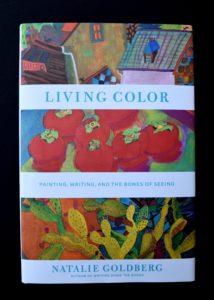 For those like me who dabble in both writing and visual arts, Natalie Goldberg has a new memoir out, Living Color: Painting, Writing, and the Bones of Seeing complete with full color photos of her visual art works! I can’t wait to dive in and learn more about her practice. Memoirs, biographies, and autobiographies of artists whom you admire are also fantastic resources to learn about practice and process!
For those like me who dabble in both writing and visual arts, Natalie Goldberg has a new memoir out, Living Color: Painting, Writing, and the Bones of Seeing complete with full color photos of her visual art works! I can’t wait to dive in and learn more about her practice. Memoirs, biographies, and autobiographies of artists whom you admire are also fantastic resources to learn about practice and process!
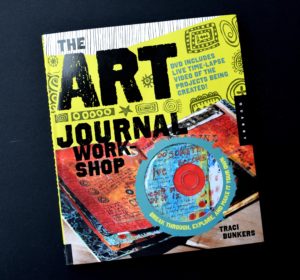 Another possibility is art journaling. There are a myriad of resources out there to help a person get started. This Art Journal guide book by Traci Bunkers, complete with DVD, provides step-by-step directions for how to achieve a variety of mixed-media looks throughout a journal book resulting in a creative collaboration between collage, scrap-booking, writing, and painting. The results are vibrant reflections of one’s own life and journey.
Another possibility is art journaling. There are a myriad of resources out there to help a person get started. This Art Journal guide book by Traci Bunkers, complete with DVD, provides step-by-step directions for how to achieve a variety of mixed-media looks throughout a journal book resulting in a creative collaboration between collage, scrap-booking, writing, and painting. The results are vibrant reflections of one’s own life and journey.
 For those who want to get into visual arts there is a new outpouring of “Grown-up Coloring Books” to enjoy. I recently picked up Joanna Basford’s Enchanted Forest from BookWoman; it was a difficult decision between that and her Secret Garden collection of what she calls, “an inky quest and coloring book.” The pages are filled with intricate patterns and designs, complete with hidden images and themes throughout each book. There are many “Grown Up Coloring Books” which include mandalas, templates to make your own designs, starters for doodling, and even something called, Zentangles—a kind of meditative intentional doodling.
For those who want to get into visual arts there is a new outpouring of “Grown-up Coloring Books” to enjoy. I recently picked up Joanna Basford’s Enchanted Forest from BookWoman; it was a difficult decision between that and her Secret Garden collection of what she calls, “an inky quest and coloring book.” The pages are filled with intricate patterns and designs, complete with hidden images and themes throughout each book. There are many “Grown Up Coloring Books” which include mandalas, templates to make your own designs, starters for doodling, and even something called, Zentangles—a kind of meditative intentional doodling.
I also included in this photo, a sample of a mandala I found online. Coloring, especially mandalas, is an incredible relaxation creativity exercise.
Local Classes/Resources:
Waco has some wonderful classes available to artists of all ages. For one-time experiences try Practically Pikasso where you can form your own fused glass or mosaic creations, or create custom glaze designs on a vast array of blank pottery shapes.
If you’d like to try your hand at a canvas, check out one of these options:
- Painting with a Twist guides participants (18+) through a specific project while sipping on a favorite adult beverage (BYOB). Each event offers a specific design, so check out their calendar and pick whichever painting you’d like to try!
- Paint the Town Waco offers painting guidance for artists of all ages. During the summer classes for kiddos are every Tuesday at the Art Center of Waco. Adult classes are held periodically at the CAST on Austin Avenue or parties and groups can book the founder & teacher, Sarah Weatherly for private events. To learn more, check out this interview she did with the Art Center of Waco!
Speaking of the Art Center of Waco, they offer classes for kiddos throughout the year. Resident ceramics artist, Jonathan Martin offers occasional adult ceramics classes as well. For more information contact the Art Center of Waco.
McLennan Community College offers a wide variety of arts classes through their Community Continuing Education program. Once you get to the site, click on the upcoming season’s program for a listing of available classes. I’ve seen anything from quilting to ceramics to photography to tango listed at quite reasonable prices for multi-session classes. It’s a great way to learn new skills and meet new friends who are learning too!
Finally, another wonderful resource is the Central Texas Artist Collective. Most recently they have been holding a series of pop-up painting in the park sessions—these are impromptu gatherings of artists of every level and ability getting together to paint, enjoy each other’s company, exchange ideas and technique, and build community through art. Supplies are usually provided and donations are always appreciated. Follow them on Facebook and/or Twitter to stay informed about upcoming events.
I hope you have now been both inspired and motivated to get out there…or stay in and create. Please share in the comments classes you’ve taken, books you’ve read, and volumes that are must-have resources on your shelves! I can’t wait to hear about what helps you get started or what gets you through your creative deserts!
 Jenuine Poetess is an artist, visionary, and community organizer. In 2010, she founded In the Words of Womyn (ITWOW), an international, grass-roots, written and spoken-word arts project with chapters throughout Los Angeles, CA; Waco, TX; and Lebanon. Jenuine is the founder of Waco Poets Society and co-founder of the Central Texas Artist Collective. She writes, organizes, and creates rooted in the fierce conviction that holding intentional space, access, and opportunity for all people to foster their creative health is a matter of justice and is a vital asset to the sustainable thriving of communities. She currently lives and poems in Central Texas where she enjoys finding new ways to disrupt the homeostasis of her city. You can contact her at: [email protected].
Jenuine Poetess is an artist, visionary, and community organizer. In 2010, she founded In the Words of Womyn (ITWOW), an international, grass-roots, written and spoken-word arts project with chapters throughout Los Angeles, CA; Waco, TX; and Lebanon. Jenuine is the founder of Waco Poets Society and co-founder of the Central Texas Artist Collective. She writes, organizes, and creates rooted in the fierce conviction that holding intentional space, access, and opportunity for all people to foster their creative health is a matter of justice and is a vital asset to the sustainable thriving of communities. She currently lives and poems in Central Texas where she enjoys finding new ways to disrupt the homeostasis of her city. You can contact her at: [email protected].
The Act Locally Waco blog publishes posts with a connection to these aspirations for Waco. If you are interested in writing for the Act Locally Waco Blog, please email [email protected] for more information.
By Catelia Vazquez
(This is part three of a three part series about “Project Promise” a Baylor School of Education initiative funded by a grant from the City of Waco. The program provides summer enrichment opportunities for gifted students in grades 4-12 who come from low-income households. Click here to read Part 1. Click here to read Part 2.)
I was a Project Promise student at the University for Young People every June from 2001 until 2008, and I absolutely loved it. It was always the most anticipated event of my summer vacation. What kind of kid was excited about “going to school” while on break from school? The gifted and talented kind. I was identified as a gifted and talented student early on in elementary school, and at the end of my fourth grade year my mom heard from word of mouth about a summer camp for students like myself. Luckily, I was granted a Project Promise scholarship from the City of Waco that year, and thus began my Project Promise experience.
As a Project Promise student I took a wide variety of classes over the years: calligraphy, cooking, Swahili, French, weaving, painting, The Real Game of Life, debate, chess, forensic science, poetry/creative writing, theatre, and logic just to list a few. I was assigned a counselor (now known as mentors) and a group each year. My counselors played a vital role in my Project Promise experience. My counselors were people I could have open conversations with regarding everything from family life to my hopes and dreams for the future. They helped me to sort through my thoughts and actively think about how to go about obtaining a college education.
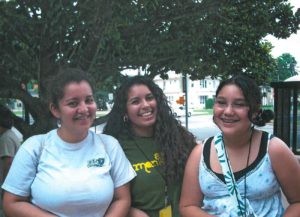 Being with the other Project Promise students in classes, during free time, and everything in between was also an important component of my success at Project Promise. I was surrounded by like-minded students, and for the most part we shared the same goal: be the first in our family to go to college. I made lasting relationships to this day with a few of my counselors, and several Project Promise students.
Being with the other Project Promise students in classes, during free time, and everything in between was also an important component of my success at Project Promise. I was surrounded by like-minded students, and for the most part we shared the same goal: be the first in our family to go to college. I made lasting relationships to this day with a few of my counselors, and several Project Promise students.
After my senior year summer at Project Promise, I returned to the program in the spring of my freshman year at Baylor as an office student worker. I had a strong desire to continue to be a part of this program that had helped me tremendously. Had it not been for Project Promise I may have never ended up at Baylor. Project Promise made Baylor a realizable goal for me. Project Promise allowed me to feel very comfortable on Baylor’s campus, to the point where there was no question in my mind as to where I was meant to go after high school. Although I loved my time spent at Project Promise as a student, my four years as a student worker there gave me an even deeper appreciation for the program. Seeing the gratitude of the families new to the program, and being an example of the success of the program to the students really reminded me of how lucky and grateful I was to have been a part of it.
Now that I have completed my Bachelor’s degree, I look back on my time at Baylor, and as a Project Promise student, and am appreciative of the opportunity given to me by the City of Waco to have attended Project Promise for as long as I did. I truly believe that my Project Promise experience gave me the confidence I needed to pursue a higher education. While working for Project Promise, I realized that I enjoyed interacting with the families, and doing my best to assist them however I could which played a huge role in me switching my major from pre-accounting to child and family studies. I hope to someday contribute to Waco, in any way possible, and Waco’s residents in the same impactful way that Project Promise did for me. I believe that if more students were exposed to a college campus in the way that I was on a regular basis, the possibility of obtaining a college education would not seem so impossible. My hope for Project Promise would be that the program could reach more students and allow them the opportunity to grow up at Baylor just as I did.
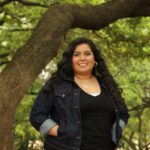 This Act Locally Waco blog post was written by Catelia Vazquez. Catelia is the Executive Administrative Assistant of Secondary Education for Waco ISD. She received her degree in Child and Family Studies from Baylor University. Catelia is currently enjoying newlywed life with her husband Eduardo.
This Act Locally Waco blog post was written by Catelia Vazquez. Catelia is the Executive Administrative Assistant of Secondary Education for Waco ISD. She received her degree in Child and Family Studies from Baylor University. Catelia is currently enjoying newlywed life with her husband Eduardo.
The Act Locally Waco blog publishes posts with a connection to these aspirations for Waco. If you are interested in writing for the Act Locally Waco Blog, please email [email protected] for more information.
(This is part two of a three part series about “Project Promise” a Baylor School of Education initiative funded by a grant from the City of Waco. The program provides summer enrichment opportunities for gifted students in grades 4-12 who come from low-income households. Click here to read Part 1.)
By Kianna Ford
As a teenager, I remember pacing around the living room with my brother waiting for the squeaky, golden bus to pick us up for the first day of University for Young People. As we approached the Baylor campus, my heart grew increasingly more excited. I couldn’t wait to step off the bus and be greeted by the Project Promise mentors.
University for Young People, “UYP” for short, is a summer enrichment program for gifted students, grades 4-12, from Waco and the surrounding area. Students who participate in UYP get to come to Baylor campus and take special classes for young people. There are dozens to choose from. You can take one in the morning and one in the afternoon. “Project Promise” is an initiative funded through the City of Waco by a Community Development Block Grant (CDBG). This program helps gifted students from low-income households participate in UYP.
In my first year, I will admit, I took the camp for granted. I thought about it as just another summer camp, something to force me out of the house for the summer. Each summer after my first year, however, I found myself scrambling through the mail for the course catalog. The last day of my final year at UYP hit me hard. I was very emotional that day and I cried a lot. In that moment, I knew that UYP was much more than just a summer camp.
Now, as a Baylor student, my job is serving as the office manager for the Center for Community Learning and Enrichment; that’s the office at Baylor that runs UYP and Project Promise. The first day of UYP is a little different for me now. I walk into my office answering parents’ questions, preparing roll sheets, and helping the mentors prepare for the moment the students step off of the bus just like I did. Behind the scenes of UYP is a tough job, but it is very fulfilling to see the students have the same opportunity I had. It also feels good to step back on the last day as the final bus rolls out and know that I contributed to something that will change their lives.
UYP was great because it helped me discover my interests and strengths. My first year, I took a poetry class and one of my poems was published in a book. I had no idea that I had a gift for writing. I continued to write throughout my years in school, perfecting my craft. Now I am journalism student at Baylor. I will use the skill I discovered in UYP in my career.
Project Promise gives under-privileged students an extra boost of confidence they often times need. It is hard to believe you will be successful when there are so many socioeconomic factors holding you back. When others tell low-income kids they can’t, Project Promise reassures them that they can.
I am very proud to say I was a Project Promise student. It gave me a great foundation to sprout into the scholar I am today. I hope that my role as office manager, student, and former attendee will encourage at least one child to continue her (or his) education, and will encourage her to give back to people who contributed to her success.
 Kianna Ford is a former University for Young People and Project Promise student. She is a Waco native and is now a Junior at Baylor University majoring in Journalism with a Public Relations Concentration. She has worked as the office manager for UYP for two summers.
Kianna Ford is a former University for Young People and Project Promise student. She is a Waco native and is now a Junior at Baylor University majoring in Journalism with a Public Relations Concentration. She has worked as the office manager for UYP for two summers.
(This is part one of a three part series about “Project Promise” a Baylor School of Education initiative funded by a grant from the City of Waco. The program provides summer enrichment opportunities for gifted students in grades 4-12 who come from low-income households.)
By Dr. Mary Witte, senior lecturer, Baylor School of Education
Can low-income gifted students benefit from a summer enrichment program? Recent research from Baylor School of Education says “yes!”
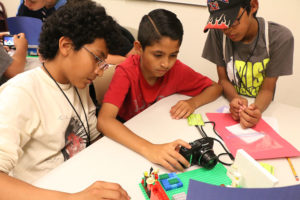 I had an inkling that former participants in our Baylor School of Education (SOE) summer enrichment program were doing well, because I keep in touch with several of them. When a survey confirmed my assumptions, I felt overwhelmed and proud, but I can’t say that I was surprised. I had heard too many anecdotes about the students’ successes. I’ve always said they are the best kids in the world. They really are amazing. They just needed a hand to guide them — not to pull them or push them.
I had an inkling that former participants in our Baylor School of Education (SOE) summer enrichment program were doing well, because I keep in touch with several of them. When a survey confirmed my assumptions, I felt overwhelmed and proud, but I can’t say that I was surprised. I had heard too many anecdotes about the students’ successes. I’ve always said they are the best kids in the world. They really are amazing. They just needed a hand to guide them — not to pull them or push them.
I am the director of University for Young People (UYP), a program for gifted students. For more than 30 years, Baylor has hosted UYP, and Wacoans have paid to send their children for valuable enrichment. Baylor UYP runs for three weeks each June on the Baylor campus, and our 180 students may choose from dozens of courses, taking one in the morning and one in the afternoon. An all-day option provides lunch and a recreational time between the two class sessions.
Since 1999, low-income students in grades 4-12 have been able to attend UYP also. Project Promise students, about 60 of them, are a subset of UYP gifted students, who also meet U.S. Department of Housing and Urban Development (HUD) federal low-income eligibility requirements. Tuition for these students is funded through a Community Development Block Grant (CDBG) to the City of Waco from HUD.
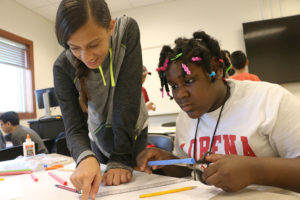 The goals of Project Promise are to develop students to aspire to higher education and to identify their strengths and interests. Most Project Promise participants attend UYP several summers in a row, beginning in 4th grade and through high school.
The goals of Project Promise are to develop students to aspire to higher education and to identify their strengths and interests. Most Project Promise participants attend UYP several summers in a row, beginning in 4th grade and through high school.
The survey of Project Promise participants, conducted by Baylor School of Education master’s student Corina Kaul, showed that of the 89 who responded, 100 percent graduated from high school. Almost all of those surveyed had either enrolled (81 percent) or planned to enroll (9 percent) in higher education in 2014. At the time of the survey, two former Project Promise students had earned graduate degrees. And I know two others since then — one graduated from Baylor with a master’s degree, and another earned a graduate degree in architecture from Yale.
Former students said that being part of Project Promise led them to choose more challenging courses in high school, prepared them for college, and influenced their decision to attend college. And that is definitely one of the program’s goals — to suggest the idea of college to these students at an early age.
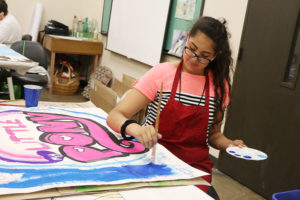 One student said in the survey, “It definitely opened me up to the idea of attending a university at a very early age, which caused me to work harder toward one day going to college. I can definitely say that I would not be where I am if it wasn’t for [Project Promise.]”
One student said in the survey, “It definitely opened me up to the idea of attending a university at a very early age, which caused me to work harder toward one day going to college. I can definitely say that I would not be where I am if it wasn’t for [Project Promise.]”
The fact that the program is on Baylor’s campus makes a difference, I believe. The first big step is just coming onto a college campus. For Waco students to come to Baylor and for their parents to be invited to campus for meetings and celebrations… it makes a difference. They are comfortable now on Baylor’s campus.
The survey also found that a lot of Project Promise graduates stay in Waco, making their hometown a better place for future generations. Through this unique collaboration, Baylor and the City of Waco are working together to improve Waco — one child at a time.
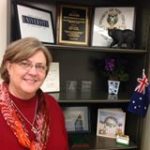 This Act Locally Waco blog post was written by Dr. Mary Witte. Dr. Witte is a senior lecturer in the Baylor School of Education and director of the SOE’s Center for Community Learning and Enrichment, which sponsors University for Young People enrichment program. In addition to Kaul and Witte, co-authors of the Gifted Child Today article are Dr. Susan Johnsen, professor of educational psychology, and Dr. Terrill Saxon, professor and chair of the Department of Educational Psychology in Baylor SOE. You can see the full research article here: Project Promise Research.
This Act Locally Waco blog post was written by Dr. Mary Witte. Dr. Witte is a senior lecturer in the Baylor School of Education and director of the SOE’s Center for Community Learning and Enrichment, which sponsors University for Young People enrichment program. In addition to Kaul and Witte, co-authors of the Gifted Child Today article are Dr. Susan Johnsen, professor of educational psychology, and Dr. Terrill Saxon, professor and chair of the Department of Educational Psychology in Baylor SOE. You can see the full research article here: Project Promise Research.
The Act Locally Waco blog publishes posts with a connection to these aspirations for Waco. If you are interested in writing for the Act Locally Waco Blog, please email [email protected] for more information.
By Matthew Polk
For the last three months, the Prosper Waco Education, Health, and Financial Security steering committees have been working to identify the most important issues facing our community and setting measurable goals for how we can work together to make positive change for people in Waco. They have reviewed data and community input and debated which issues should be attacked first. While there are some details to be finalized, the committees have reached consensus on a set of goals that will form the common agenda of the Prosper Waco initiative. These are big goals—goals that will take a true community effort to achieve. And if we achieve them, the entire community will benefit. What are these goals?
Education
Kindergarten Readiness: For children to succeed in school, they have to be prepared to learn when they start Kindergarten. This means that they need a healthy start in life so that they develop strong bodies and brains. It also means that they need to know certain things (like letters and numbers) that will help them understand what the teacher is teaching so that they can stay on track academically. The Prosper Waco initiative will work to make sure that parents and families have the resources and information they need to help their children grow and learn so that more students in Waco are ready for Kindergarten.
Post-secondary completion: Students who complete a college degree or a workforce certificate have a better chance of getting a job that will provide enough income for them to support themselves and their families. To help our community members move out of poverty, we need to help more students find the college degree or certificate that is right for them and give them the support they need to finish that program. The more community members who have workforce training or college degrees, the stronger our local economy will be.
Health
Access to Care: Too many people in our community can’t afford to see the doctor when they are sick. This means that too many people end up visiting the hospital Emergency Room when they could have saved time and money by seeing a doctor for a minor illness. The more community members who have health insurance and can afford to see the doctor rather than visiting the ER, the healthier we will be. And when more people get the primary care they need, our hospitals and emergency rooms can do an even better job of serving those who really need them.
Obesity: Obesity is a health challenge facing more and more Americans. Many communities struggle to build a culture of health that will encourage all community members to take care of their bodies so that they can be as healthy as possible. Reducing obesity by helping Wacoans understand their health, stay active, and make better food choices is a goal of the Prosper Waco initiative.
Women’s Health: Our community’s health data shows that too few women get the annual checkups they need to stay healthy. When pregnant women don’t have access to good healthcare, their babies can be born unhealthy. Babies born to teenage mothers often have worse health and education outcomes than their peers. The Prosper Waco initiative will work to make sure that all women have access to the healthcare they need and that all babies born in our community have the best chance to be born strong and healthy.
Mental Health: Mental health issues affect all types of people, regardless of race or class. Effectively serving the mental health needs of a diverse community is challenging. A lack of mental health resources means that many people must rely on the hospital Emergency Room for mental health needs. Often these patients do not receive the type of care that they most need. The Prosper Waco initiative will work to increase access to mental health resources for our community.
Financial Security
Employment: Having a paying job is the first step to financial security. There are nearly 2,000 young people between the ages of 16 and 24 in our community who are not enrolled in school and do not have a job. Connecting these young people to the workforce will give them the chance to build financial security and will strengthen our local economy.
Income: Many of our community members are working hard to make ends meet, but their paycheck isn’t enough to provide real financial security for their families. The best way to increase the income of hard-working people in our community is to help get a job that pays enough to support themselves and their family. This could mean helping them develop new job skills or helping them overcome barriers such as transportation or child care needs that may be blocking their ability to get a job that pays enough.
Wealth: Financial Security means having enough to be sure that your family can handle a financial bump in the road. Wealth is measured by a family’s assets—how much it can save and invest, how much the home it owns is worth, etc. Helping families understand how to build assets that will provide more financial security is a goal of the Prosper Waco initiative.
*************
If we can achieve the goals set by the Prosper Waco steering committees, more people in our community will be able to get a good education, find a job that supports their family, and make sure that they and their family stay healthy. If you are interested in how we will measure our progress toward these goals, be watching our website — www.prosperwaco.org —where we will be posting more information about the initiative’s goals, the data that supports them, and our progress toward achieving them.
Are you interested in helping our community work toward these goals? We are building working groups that will focus on each of the goals listed above. If you want to be part of the process of developing strategies for achieving these goals in your community, we welcome you to join the Prosper Waco team. You can email Jillian Obenoskey, our Community Engagement Coordinator, at [email protected], or call her at 741-0081 to learn more about how you can be involved.
You don’t have to be an expert in Education, Health, or Financial Security to help our community achieve the goals of Prosper Waco. You just have to be willing to contribute your ideas and energy to coming up with creative ways to help people in our community measurably improve their lives.
 Matthew Polk is Executive Director of Prosper Waco. Prior to that, he served as Superintendent of Rapoport Academy Public School. He and his wife attended Baylor, and after spending a few years in the northeast, they returned to Waco to raise their family. They have four children, ages 8 to 3 months. You can contact him at [email protected].
Matthew Polk is Executive Director of Prosper Waco. Prior to that, he served as Superintendent of Rapoport Academy Public School. He and his wife attended Baylor, and after spending a few years in the northeast, they returned to Waco to raise their family. They have four children, ages 8 to 3 months. You can contact him at [email protected].
The Act Locally Waco blog publishes posts with a connection to these aspirations for Waco. If you are interested in writing for the Act Locally Waco Blog, please email [email protected] for more information.
By Crystal Hernandez
May 2, 2015. Pacquiao vs. Mayweather. Billed as the Fight of the Century, this matchup was expected to be the highest-grossing match in history. The revenue from pay-per-view purchases alone proved that it was. Some might argue that the fight was less than expected.
I’m here to tell you, though, a fight bigger transpires every day. Imagine you are standing in one corner of the ring. As your opponent climbs through the ropes, you find yourself eye to eye with cancer. That’s right. You’re up against the big “C.” That’s the fight of your life, but you don’t have to fight it alone. LIVESTRONG® at the YMCA is right beside you, gloves on and ready to help you overcome your opponent.
Punch one: Cancer steals your peace and rocks your world. Punch two: Cancer takes away your hair, your breast, your endurance, your stamina, your energy, and your self-esteem. Punch three: Cancer staggers your family, destroys your finances and leaves your head spinning while you’re clinging to the ropes with all you’ve got.
Advances in medicine help many claim victory. However, the battle leaves the champion black and blue, tired and broken. When the fight is over, supporters and fans move on, leaving survivors alone to figure out what happens next in their stories. In the quiet that follows, survivors are left searching for a “new” normal. LIVESTRONG at the YMCA can help.
LIVESTRONG at the YMCA steps in to be the Creed to your Rocky helping you reclaim your health and wellness. The free program improves endurance, stamina, strength, balance and flexibility. You find a new group of fans in the survivors that join you, and emotional healing occurs. The twice-a-week 90-minute sessions help develop better health through cardiovascular and weight machines, free weights, resistance bands and modified classes. Two specially trained instructors take you under their belts to show you the “ropes”.
Support continues after each 12-week session with LIVESTRONG at the YMCA Nights. Survivors and caregivers reunite with other participants and take part in fun activities, such as belly dancing, bunco and visits to the theater.
If you are a cancer survivor and would like more information about the next session, contact Chronic Disease Prevention Specialist Crystal Hernandez at (254) 776-6612 or [email protected]. If you would like to show your support, sign up for the LIVESTRONG at the YMCA Race. The 4th annual event will be Oct. 3, 2015, at Woodway Park. Sign up for the 1K, 5K or 10K via Active.com or at the Welcome Desk at Waco Family YMCA. Sponsorship opportunities are available. Donations can be made directly to the Y to support the LIVESTRONG at the YMCA.
LIVESTRONG at the YMCA is our way of making sure no one fights cancer alone. When cancer throws a blow to you or a loved one, the Y can help pick you up, dust you off and give you the strength and endurance to come back swinging. Together, we can take back what cancer takes away.
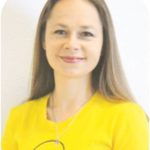 This Act Locally Waco blog post was written by Crystal Hernandez. Crystal is the Chronic Disease Specialist for the Waco Family YMCA. She received her degree in Exercise Science and Health Promotion from the University of Memphis. She and husband Shawn are blessed to be the parents of 4 beautiful children. In her free time, she loves hitting the pavement and pounding out a good run.
This Act Locally Waco blog post was written by Crystal Hernandez. Crystal is the Chronic Disease Specialist for the Waco Family YMCA. She received her degree in Exercise Science and Health Promotion from the University of Memphis. She and husband Shawn are blessed to be the parents of 4 beautiful children. In her free time, she loves hitting the pavement and pounding out a good run.
The Act Locally Waco blog publishes posts with a connection to these aspirations for Waco. If you are interested in writing for the Act Locally Waco Blog, please email [email protected] for more information.
By Chris McGowan
My old college roommate used to say, “Nobody really ever thought Gallagher’s jokes were funny, people came to watch him smash watermelons, so get to smashing Gallagher…” What he meant was that he wanted me to quit talking and start doing.
This past Year Waco has been portrayed incredibly positively on the national stage regularly thanks to College Gameday, Fixer Upper, and others. Suddenly Waco is becoming a place people want to be. It’s increasingly viewed as an up and coming interesting place, and our best days are ahead. Our community has made spectacular progress in the last few years, thanks to the extraordinary efforts of everyone involved.
Take a minute to pat yourself on the back, because if you’re reading this, you are a big part of this community’s success…
…ok now let’s get back to work…
2015 will be the year that we see the most significant change to date in greater downtown. Market pressures have built up a head of steam and public sector priorities are aligned to make great things happen. It will only be successful if you continue to work to make it so.
The time to capitalize on momentum that has been building for the past several years is now. Along those lines, it’s time for us to do what we came to do. It’s time to start smashing watermelons.
That’s means actively engaging to make Waco a better place; Acting locally is all you have to do. Make Waco yours. Support local business, buy local art, or do something to make your community more beautiful — it’s fun and that’s all it takes.
Along those lines here are ten things you can do to connect in your neighborhood.
- Go outside, this is important, it’s not so scary out there.
- Get to know your bartenders and barristas.
- Have a contact in your regular dining and shopping establishments, relationships are everything.
- Befriend the neighborhood pets, Evie loves you!
- Organize a regular weeknight get together and do it every week.
- Talk to strangers.
- Vote. Make sure your voice is heard.
- Do something to make your neighborhood more beautiful, if not you who will?
- Act like a tourist sometimes and check out museums, monuments, etc…
- Take some time once a month to just walk around and explore.
Want to get even more involved? Join 1000 Friends of Waco. The primary goal of 1000 Friends of Waco is to prepare residents to be advocates for a vibrant, successful Greater Downtown Waco. Join us in being a part of the discussion daily by following us on Facebook and Twitter @1000friendswaco.
Thank you for working to make Waco a better place. We can’t do it without you.
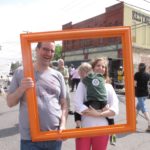 This Act Locally Waco blog post is written by Chris McGowan. Chris is the Director of Urban Development at the Greater Waco Chamber of Commerce. At the Chamber, Chris has been responsible for working with the business community, the public sector and other stakeholders to help revitalize our urban core and strengthen the heart of our city. He is husband of Cristi, dad of Ollie, and for fun he is a charcutier. If you even know what that word means, you are probably eating way too much bacon!
This Act Locally Waco blog post is written by Chris McGowan. Chris is the Director of Urban Development at the Greater Waco Chamber of Commerce. At the Chamber, Chris has been responsible for working with the business community, the public sector and other stakeholders to help revitalize our urban core and strengthen the heart of our city. He is husband of Cristi, dad of Ollie, and for fun he is a charcutier. If you even know what that word means, you are probably eating way too much bacon!
The Act Locally Waco blog publishes posts with a connection to these aspirations for Waco. If you are interested in writing for the Act Locally Waco Blog, please email [email protected] for more information.
By Jenuine Poetess
Ars Longa, Vita Brevis
I first heard those words in my high school Latin class many…many moons ago. Art is long, life is short. We were translating phrases, classic wisdoms and warnings like, Cave Canem! “Beware of Dog!” or Caveat Emptor! “Let the buyer beware!” At the time, they didn’t hold much water for me; I was just glad for short translations!
Earlier this month I gathered with 100 other artists and poets in Salerno, Italy, for the inaugural 100Thousand Artists for Change World Conference. We converged on this glorious Mediterranean city for 8 days to discuss the role, the responsibility, and the resource of art in furthering missions of peace, justice, and sustainability in our communities world-wide. Indeed I learned a great deal from my journey and the relationships forged during that time. More broadly than my own personal process, I’ve come away with an even deeper, more pressing urgency regarding the importance of art.
I had the remarkable opportunity to spend a day in Pompeii. The ruins of this city, more than any other I have experienced, moved me in profound ways. (For those unfamiliar with the history of Pompeii, this site is an excellent resource). What especially struck me was the pristine preservation of art–as a result of the city being buried in volcanic ash and debris–paintings, sculptures, frescos, and mosaics have withstood time in radiant resilience.
My fingers gingerly traced the still-vibrant work of another’s hands, over two millennia ago. I was scolded, in Italian. But for a moment, a sacred second, across time and space I connected with another artist. I was humbled. Not by the scolding. By the enormity of art. It is so much more vast than you or I or Waco or Texas or the US or even all of the world. Art is both this very moment and all of eternity. A poem, a song, a painting, a photo, a sculpture, a dance, an installation, a mural, a mosaic—all of it is a mere breath of time, one pulsing beat of the heart. What inspires us to document that moment, above so many others? What moved us to immortalize that person, that sentiment, that truth out of the myriad experienced across the span of life? Why capture it at all?
Ask any artist why art matters and for as many people you interview, you may have that many answers. We create art to make statements, to make movements, to make emotions, to make changes, to make revolution, to make beauty, to make love.
Singular individuals create, sometimes collaborate. What we make is personal, intimately, privately, personal. And often so very public and political. It is said, what a skillful artist creates is both personal and universal; all at once. That creation is a signature of a specific person and yet, accessible from every angle, age, belief, generation, language, culture, identity, and experience. That is the grail after which we—sometimes obsessively—strive: universality.
But why? What does it matter if someone creates or does not? If it is personal or universal? Wouldn’t we be just fine without art?
Consider music, the way it moves the body, the soul. Have you ever had a poignant moment connected with music? Have you ever designed a soundtrack to your life or a particular season? Think about the countless photos—yes even selfies—snapped with a camera or phone. Do you realize you are creating art? What about those drawings made by little ones tacked to refrigerator doors and cubical walls? Or the texture and hue of that wool you knitted into a scarf to hold Winter’s winds at bay? Remember that moment, bigger than your being, when words became insufficient to articulate all that needed to be expressed? Or the way the curve and tangle of that gnarled old Oak, caught your breath, in that particular instant. What about that time that you met one who stirred places long dormant within you, and poetry, unexpected, flowed forth from your unassuming pen?
Art is everywhere and in everything. In the magnificence of creation, in the hues of our skin, in the ache of our tragedies.
Art invites us to indulge in sensual pleasures sating taste, touch, sight, sound, scents. Art asks questions we cannot bear to utter. Art shows us what and how the world could be. Art holds up an unapologetic mirror reminding us, teaching us who we are. Art is a timeless narrative, telling our stories long after our echoes have subsided into the earth. Art is a tool to heal, to listen, to understand, to become.
In a magnificent project by Janice Lee, she calls for #finalpoems asking poets for their last words to an ending world.
Why?
Lee writes:
“Because one yet wants to believe that poetry can still be about the catastrophe and beauty of one’s own heart, and the generous giving away of those words to another.
If the world were to end next week, what is the final poem you write, the final poem you give away generously, treacherously, genuinely, fearfully, necessarily, beautifully?
That tomorrow it may very well all end, and we would know to bear the pain as the day rose and broke.
That the present is undying yet death awaits us all.
That words can still connect and touch, that we still know how to offer to others a piece of our soul.
That space yet expands and we know when to keep breathing and when to stop.
That poetry can yet be given and received, from one human being to another.”
I consider the works of art preserved by a volcano that destroyed an entire city in 79 AD. I awe and wonder how inside that moment of agony and death, art endured–audaciously, vibrantly, resiliently.
 Jenuine Poetess is an artist, visionary, and community organizer. In 2010, she founded In the Words of Womyn (ITWOW), an international, grass-roots, written and spoken-word arts project with chapters throughout Los Angeles, CA; Waco, TX; and Lebanon. Jenuine is the founder of Waco Poets Society and co-founder of the Central Texas Artist Collective. She writes, organizes, and creates rooted in the fierce conviction that holding intentional space, access, and opportunity for all people to foster their creative health is a matter of justice and is a vital asset to the sustainable thriving of communities. She currently lives and poems in Central Texas where she enjoys finding new ways to disrupt the homeostasis of her city. You can contact her at: [email protected].
Jenuine Poetess is an artist, visionary, and community organizer. In 2010, she founded In the Words of Womyn (ITWOW), an international, grass-roots, written and spoken-word arts project with chapters throughout Los Angeles, CA; Waco, TX; and Lebanon. Jenuine is the founder of Waco Poets Society and co-founder of the Central Texas Artist Collective. She writes, organizes, and creates rooted in the fierce conviction that holding intentional space, access, and opportunity for all people to foster their creative health is a matter of justice and is a vital asset to the sustainable thriving of communities. She currently lives and poems in Central Texas where she enjoys finding new ways to disrupt the homeostasis of her city. You can contact her at: [email protected].
The Act Locally Waco blog publishes posts with a connection to these aspirations for Waco. If you are interested in writing for the Act Locally Waco Blog, please email [email protected] for more information.
By Megan Henderson
How do you say to your child in the night?
Nothing’s all black, but then nothing’s all white
How do you say it will all be all right
When you know that it might not be true?
What do you do?
Careful the things you say
Children will listen
Careful the things you do
Children will see and learn
Children may not obey, but children will listen
Children will look to you for which way to turn
To learn what to be
Careful before you say, “Listen to me”
Children will listen.
–Stephen Sondheim, Into the Woods
When I look at my children, I don’t really see their outward appearance. Perhaps this is why they are more often than not dressed in miss-matched outfits, their hair is more matted than brushed, and they have to complain of the blisters on their feet before I realize they’ve outgrown their shoes. For better or worse, my husband and I work to meet their basic physiological needs and then spend the majority of our parenting efforts on their behavior and attitudes—and our kids are precocious, so this is a more monumental task than we bargained for.
If I’m being honest, I should confess that we’ve never had a true parenting strategy session about how to talk to our kids about race relations in our country. We’ve kind of just navigated our path, generally on the same page, and things have worked out just fine. With just a little coaching, my kids started calling my skin peach, daddy’s skin dark brown, and their skin brown—because dark brown and peach make brown. These nomenclatures have stuck, giving my preschoolers a way to describe their world and their friends without having to understand the complex social and psychological issues behind race relations in America.
On June 17, a gunman opened fire on a Bible study at Emanuel AME Church in Charleston, and my heart exploded with emotions that catapulted me into deeper contemplation about how we talk about race in our home and how my children are viewed in the Waco community. Let me be clear, my family has never experienced any overt racism in Waco. We’ve never felt physically threatened, and certainly have never had our lives in danger. We are blessed. We have been lucky. I also know, however, that if my husband and children had been in that church basement, they would have been the assassin’s targets just like the nine victims who share their skin color. When I think of the tragedy in that context, my instincts go on overdrive and I want to start attacking the world. I want to hunt down any and all injustices and do rhetorical battle, and I want to win. I want to seek out the adversaries and annihilate them with pithy arguments, litigation and prosecution. I want to go on the attack in a grandiose way to tackle the enormity of the task at hand.
But then I take a deep breath and look to the example set by Dr. Martin Luther King, Jr. when he delivered the eulogy for the victims of the Birmingham church bombings in 1963 saying, “[The victims] say to each of us, black and white alike, that we must substitute courage for caution. They say to us that we must be concerned not merely about who murdered them, but about the system, the way of life and the philosophy which produced the murderers.” And then I know that there’s a way to affect the community in which my kids will grow up without leaving people in my wake. It starts in my own home by changing our dialogue about race and bringing it to the forefront of our efforts to mold and shape our kids into the humans that we hope for them to be, that we need for them to be.
I will tell my 6-year-old daughter and my 4-year-old son what happened in Charleston because I want them to be a part of a society that does better, that produces more love and less hate. I will say to Miles, whose name means solider, “This is why my heart breaks every time you ‘play’ guns with your friends at school. Killing people with a gun is not playful and should not be fun. Yes, there is a time to fight injustice. Let’s learn to fight by choosing to lead by peaceful example instead.” I will say to Karis, whose name means grace, “This is why, when you say that you feel different at school and that kids tell you you’re not pretty because you don’t have blond hair, I’m extremely sensitive about you being ostracized and picked on by students and teachers alike. Forgive the friends who are mean to you and be kind to everyone always. Know that the content of your character is more important than your appearance.”
And, I would have this conversation with my kids even if their skin weren’t half black. Yes, I pray for peace and comfort for the Emanuel African Methodist Episcopal Church and the friends and families of the victims, but I also pray that we all find a way to do something to change the system and the philosophy that produces these heinous crimes against humanity, even if that something starts with a simple conversation with our kids.
 This Act Locally Waco blog post is written by Megan Henderson. Megan, by virtue of taking her husband’s last name, is often confused with the executive director of Waco Downtown Development Corporation. This Megan Henderson, however, works at Baylor University in Institutional Events and as an adjunct professor in Baylor’s department of journalism.
This Act Locally Waco blog post is written by Megan Henderson. Megan, by virtue of taking her husband’s last name, is often confused with the executive director of Waco Downtown Development Corporation. This Megan Henderson, however, works at Baylor University in Institutional Events and as an adjunct professor in Baylor’s department of journalism.
The Act Locally Waco blog publishes posts with a connection to these aspirations for Waco. If you are interested in writing for the Act Locally Waco Blog, please email [email protected] for more information.
By Hattie McGill
I would like to take the opportunity to thank Dang for being so kind to my youngest son Perry! Hoang Dang is a Baylor Graduate who became my son’s mentor through the Big Brothers and Big Sisters program when Perry was about 9 or 10 years old.
Having technology in college nowadays is a must since everything is done on computers from lecture notes, to tests! About two weeks ago Dang called me and said to take Perry to Barnes and Noble. He asked me not to tell Perry why he was there. Dang wanted it to be a surprise to him.
It was difficult to surprise Perry with a trip to Barnes and Noble because he knows that I get tired of going there — he loves that store. When we went in he asked, “So why are we here Mom?” My reply of “Oh! I just I came to pick up something,” only fueled the fire!
Dang gave Perry a NOOK TABLET!
I don’t think Dang could get a word in edgewise between Perry’s “Thanks Man!” and his “Oh! My God! Thanks!” Last week Perry received Dang’s older (looks like new) iPhone! What a blessing and a big help in college! I had been searching to find a used model for Perry’s birthday on the 20th of this month, but even they were too expensive. Perry, was so happy! He had received some very disappointing news earlier that day.
Look at God! How He will bless you, and how He allows others to be a blessing to you! Thank you Dang! Perry is going to need both of these technologies in College. They will be a big help to him to look up references and research information and various items of that nature. They will be a big blessing to him!
Big Brothers and Big Sisters is a worthwhile organization especially for children like my son who are from a single parent household. I was married to Perry’s Father and went through a terrible divorce! However, it does not matter HOW you’re single parent, you are still a single parent and when a person dedicates himself to your child and actually helps him over and beyond what he is required to, it is a big blessing!
I thank God for the Big Brothers, and Big Sisters Program in Waco, Texas, that helped my son and Dang to meet and form a lifetime relationship!
Dang taught Perry so many valuable lessons such as how to be a Christian male, how to be respectful, how to study and stay committed to your education, and how to work hard for what you want out of life. Dang believes in these principles; that is why he’s about to become a Medical Doctor in the coming months. Because he took the time out of his busy life to mentor and bless my child, God is taking the time to bless him!
Dang taught Perry how to play chess when he was very young and he has not forgotten it! He taught him how to reach and obtain his goals and he has not forgotten that either. With the encouragement from Dang, and his other mentor Garrett League, and his biological big brothers Steve and Kendrix Wilson, Perry finished his second semester of College at TSTC and he passed his classes! This Semester has been a very, very difficult time for Perry, but he pushed through it with his faith in God.
I thank God for Dang’s gift to my son! I thank God for Perry being a part of Dang’s life, and Dang being a part of ours. My mother took him as hers! I know that his patients are going to be blessed because he is going to be their Doctor.
Thank You Dang for caring for my child!
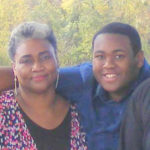 This Act Locally Waco blog post was written by Hattie McGill. Hattie is a mom of three sons, an author and she is known regionally as a gospel singer. She recently appeared in the Waco Civic Theatre production of the musical “Crowns.” Her children’s book, Daddy Practice What You Preach: Come Home Daddy, is available on Amazon.com.
This Act Locally Waco blog post was written by Hattie McGill. Hattie is a mom of three sons, an author and she is known regionally as a gospel singer. She recently appeared in the Waco Civic Theatre production of the musical “Crowns.” Her children’s book, Daddy Practice What You Preach: Come Home Daddy, is available on Amazon.com.
The Act Locally Waco blog publishes posts with a connection to these aspirations for Waco. If you are interested in writing for the Act Locally Waco Blog, please email [email protected] for more information.

